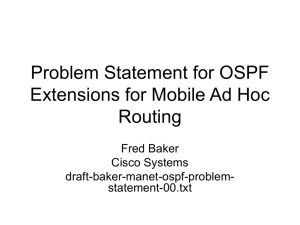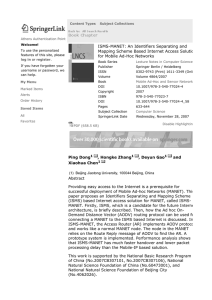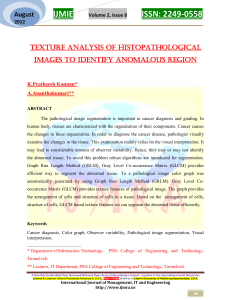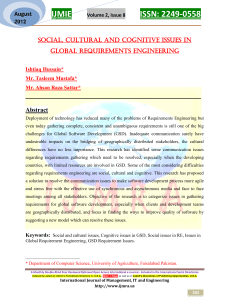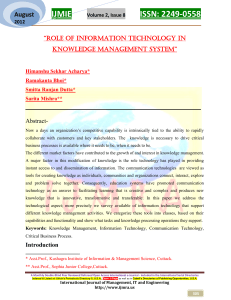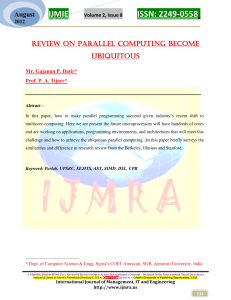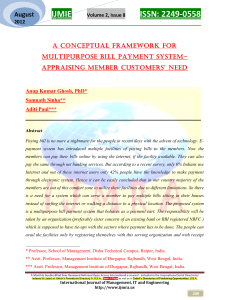full Lenght Paper...
advertisement
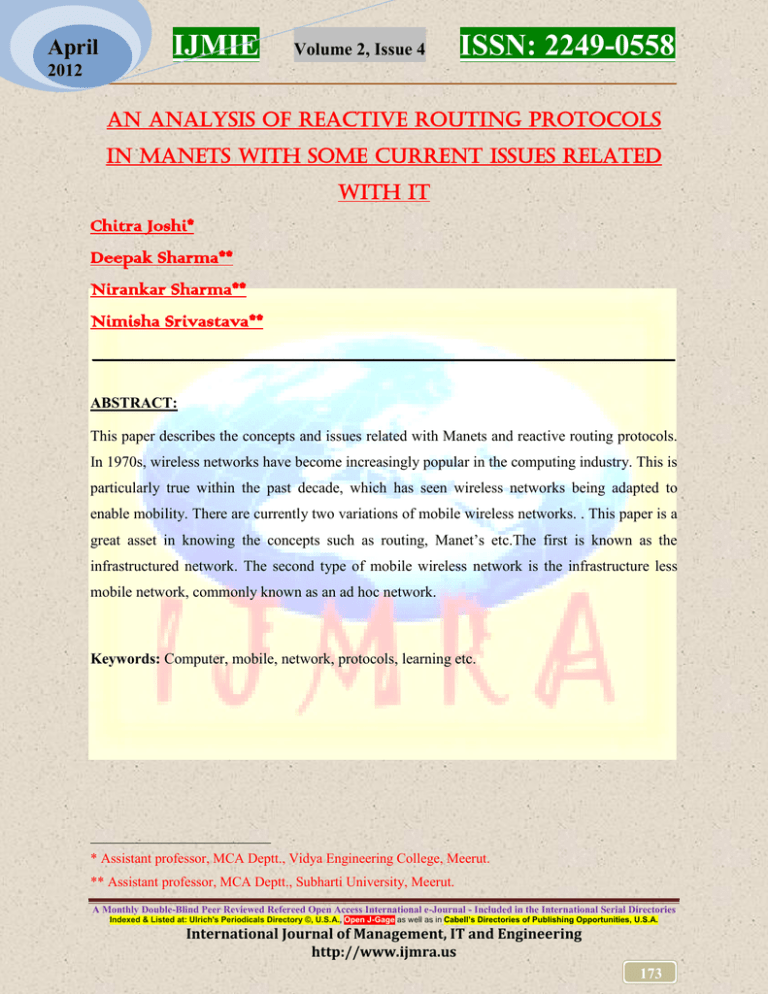
April IJMIE Volume 2, Issue 4 ISSN: 2249-0558 2012 ___________________________________________________________ An Analysis of Reactive Routing Protocols in Manets with some current issues related with it Chitra Joshi* Deepak Sharma** Nirankar Sharma** Nimisha Srivastava** __________________________________________________________ ABSTRACT: This paper describes the concepts and issues related with Manets and reactive routing protocols. In 1970s, wireless networks have become increasingly popular in the computing industry. This is particularly true within the past decade, which has seen wireless networks being adapted to enable mobility. There are currently two variations of mobile wireless networks. . This paper is a great asset in knowing the concepts such as routing, Manet’s etc.The first is known as the infrastructured network. The second type of mobile wireless network is the infrastructure less mobile network, commonly known as an ad hoc network. Keywords: Computer, mobile, network, protocols, learning etc. * Assistant professor, MCA Deptt., Vidya Engineering College, Meerut. ** Assistant professor, MCA Deptt., Subharti University, Meerut. A Monthly Double-Blind Peer Reviewed Refereed Open Access International e-Journal - Included in the International Serial Directories Indexed & Listed at: Ulrich's Periodicals Directory ©, U.S.A., Open J-Gage as well as in Cabell’s Directories of Publishing Opportunities, U.S.A. International Journal of Management, IT and Engineering http://www.ijmra.us 173 IJMIE April Volume 2, Issue 4 ISSN: 2249-0558 2012 ___________________________________________________________ Introduction: A mobile ad-hoc network (MANET) is a self-configuring infrastructure less network of mobile devices connected through wireless links. Each device in a MANET is free to move independently in any direction. Each must forward traffic related to its own use, and therefore be a router. A MANET can be a standalone network or it can be connected to external networks (Internet). The primary challenge in building a MANET is equipping each device to continuously maintain the information required to properly route traffic. Such networks may operate by themselves or may be connected to the larger Internet. In Manet Nodes are mobile, topology can be very dynamic. Nodes must be able to relay traffic since communicating nodes might be out of range. Use of Manets: In Military scenarios In Sensor networks In Rescue operations In Students on campus In Free Internet connection sharing [Diagrams of Manets] A Monthly Double-Blind Peer Reviewed Refereed Open Access International e-Journal - Included in the International Serial Directories Indexed & Listed at: Ulrich's Periodicals Directory ©, U.S.A., Open J-Gage as well as in Cabell’s Directories of Publishing Opportunities, U.S.A. International Journal of Management, IT and Engineering http://www.ijmra.us 174 April IJMIE Volume 2, Issue 4 ISSN: 2249-0558 2012 ___________________________________________________________ Routing Protocol in Manets: A mobile ad hoc network (MANET) is formed by a cluster of mobile stations randomly located within a certain area without the infrastructure of base stations. In MANET stations communicate with each other by sending and receiving packets . The delivery of packet from a source station to a destination station is called routing. In Manets there are two types of Protocols are used. 1. Pro-active Routing Protocol: Routes are calculated before one is needed. It tries to keep routing-information to all nodes every time up-to-date. 2. Re-active routing protocol: Reactive routing protocols do not take initiative for finding routes. It establishes routes “on demand” by flooding a query. Current issues related with Manets: 1. Thwarting Attacks On MANET: A Mobile Ad hoc network (MANET) or cell phone mesh network uses software to transparently hook together numerous active cell phones in a location to provide greater bandwidth and better network connections by allowing users to share "spare" resources while they use their phones, making data transfers faster and smoother. However, the usefulness of such ad hoc networks can A Monthly Double-Blind Peer Reviewed Refereed Open Access International e-Journal - Included in the International Serial Directories Indexed & Listed at: Ulrich's Periodicals Directory ©, U.S.A., Open J-Gage as well as in Cabell’s Directories of Publishing Opportunities, U.S.A. International Journal of Management, IT and Engineering http://www.ijmra.us 175 IJMIE April Volume 2, Issue 4 ISSN: 2249-0558 2012 ___________________________________________________________ be offset by vulnerabilities. Like any network, a MANET can be susceptible to attack from people with malicious intent. Illicit users might, for instance, hook up to such a network and impersonate a legitimate user in an effort to access data and logins to which they do not have approval, others may implant harmful software, malware. The most worrying form of attack, however, is the distributed denial of service (DDoS), which effectively swamps the network with random data requests until it is overwhelmed. This might simply be for the sake of causing disruption but it a DDoS attack might also be used to hook into security loopholes and quickly and transparently implant malware to harvest logins, bank details and other private information. 2. Measuring effect of Wi-Fi Attack: Researchers from North Carolina State University have developed a way to measure how badly a Wi-Fi network would be disrupted by different types of attacks -- a valuable tool for developing new security technologies. Wi-Fi networks, which allow computer users to access the Internet via radio signals, are commonplace -- found everywhere from offices to coffee shops. And, increasingly, Wi-Fi networks are important channels for business communication. As a result, attacks that jam Wi-Fi networks, blocking user access, are not only inconvenient but have significant economic consequences. References: Ahmed S. and Ramani A. K., “Exploring the Requirements for QoS in Mobile Ad hoc Networks,” Journal of Information & Communication Technology Vol. 1, No. 2, 2007- 0109 Aziz S. R. A., Endut N. A., Abdullah S. and Daud M. N. M., “Performance evaluation of AODV, DSR and DYMO routing protocol in MANET”, CSSR 08-09, 14 -15 March 2009. Huang R., Zhuang Y., Cao Q., “Simulation and Analysis of Protocols in Ad Hoc Network”, 2009 International Conference on Electronic Computer Technology © 2009 IEEE M.S. Corson, S. Batsel and J. Macker, “Architecture consideration for mobile mesh networking”, Conference Proceeding, IEEE, Vol.1, 21-24 Oct. 1996, pp. 225-229. A Monthly Double-Blind Peer Reviewed Refereed Open Access International e-Journal - Included in the International Serial Directories Indexed & Listed at: Ulrich's Periodicals Directory ©, U.S.A., Open J-Gage as well as in Cabell’s Directories of Publishing Opportunities, U.S.A. International Journal of Management, IT and Engineering http://www.ijmra.us 176 IJMIE April Volume 2, Issue 4 ISSN: 2249-0558 2012 ___________________________________________________________ Ghanta Ravikiran and Suresh Singh, Influence of Mobility Models on the Performance of Routing Protocols in Ad-Hoc Wireless Networks, IEEE VTC'04 (Spring), Milan, Italy, May 17-19, 2004. Bokyung Wang and Suresh Singh, Computational Energy Cost of TCP, IEEE INFOCOM'04, Hong Kong, March 7-11, 2004. H. Yang, H. Luo, F. Ye, S. Lu, and L. Zhang, "Security in Mobile Ad Hoc Networks: Challenges and Solutions," in IEEE Wireless Communications, vol. 11(1), pp. 38- 47, Feb 2004. V. Varadharajan, R. Shankaran, and M. Hitchens, "Security for cluster based ad hoc networks," in Elsevier Computer Communications, vol. 27(5), pp. 488-501, Mar 2004. A Monthly Double-Blind Peer Reviewed Refereed Open Access International e-Journal - Included in the International Serial Directories Indexed & Listed at: Ulrich's Periodicals Directory ©, U.S.A., Open J-Gage as well as in Cabell’s Directories of Publishing Opportunities, U.S.A. International Journal of Management, IT and Engineering http://www.ijmra.us 177


